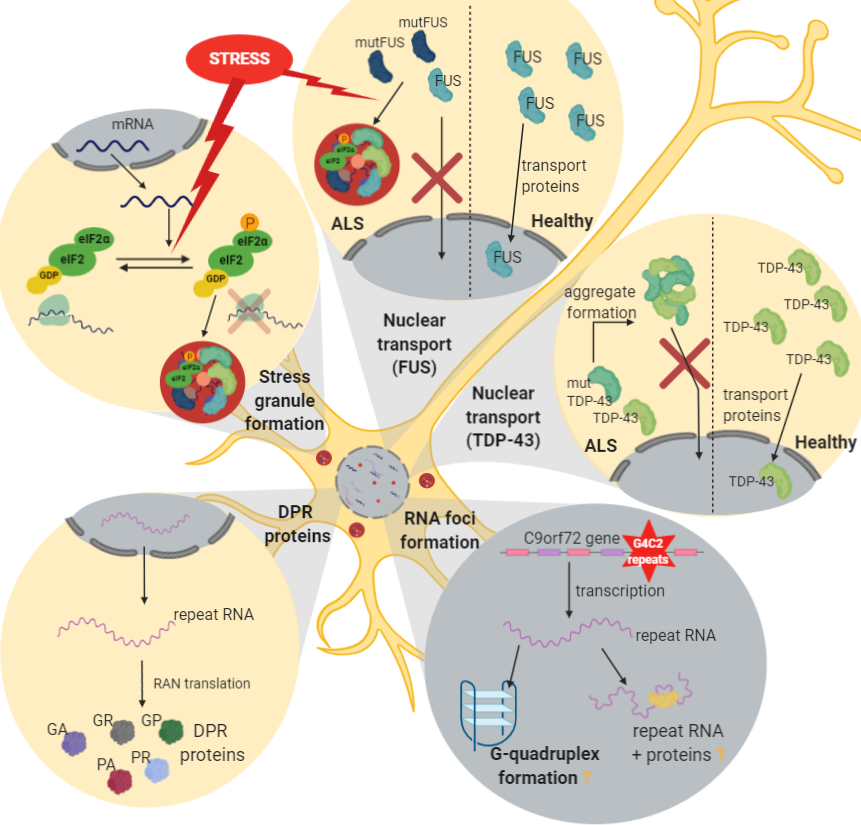Molecular mechanisms in neurodegeneration
Our group is working on molecular processes associated with neurodegenerative disorders, such as amyotrophic lateral sclerosis (ALS), frontotemporal dementia (FTD) and Alzheimer’s disease. We mainly study disease association with nuclear transport, cell response to stress and various changes in macromolecular interactions (protein:protein and protein:RNA).
Proteins TDP-43 and FUS are major contributing factors in ALS and FTD. They are both predominantly nuclear proteins that are implicated in processing and transport of RNA, thus majority of our work has been focusing on their nuclear transport, RNA binding properties and pathological significance of their RNA and protein interactomes. We also work on functional genetics, pathology and molecular mechanisms of the hexanucleotide repeat expansion mutation in C9ORF72 gene. We have shown toxicity mechanisms can arise from the repeat RNA as well as the dipeptide repeat proteins translated from the repeat RNA. We have also shown that the sense strand can form G-quadruplexes, while the antisense strand can form i-motifs/protonated hairpins and characterized the proteins that bind to both strands of RNA.
We are involved in international consortia for genetic characterization of ALS.

Selected publications
- MALNAR, Mirjana, ČERČEK, Urša, YIN, Xiaoke, TIN HO, Manh, REPIČ-LAMPRET, Barbka, NEUMANN, Manuela, HERMANN, Andreas, ROULEAU, Guy, SUTER, Beat, MAYR, Manuel, ROGELJ, Boris. Phenylalanine-tRNA aminoacylation is compromised by ALS/FTD-associated C9orf72 C4G2 repeat RNA. Nature communications, 202314, 5764, 1-15
- MOTALN, Helena, ČERČEK, Urša, YAMOAH, Alfred, TRIPATHI, Priyanka, ARONICA, Eleonora, GOSWAMI, Anand, ROGELJ, Boris. Abl kinase-mediated FUS Tyr526 phosphorylation alters nucleocytoplasmic FUS localization in FTLD-FUS. Brain : journal of neurology, 2023, 37
- BOŽIČ, Janja, MOTALN, Helena, PUCER JANEŽ, Anja, MARKIČ, Lara, ROGELJ, Boris, et al. Interactome screening of C9orf72 dipeptide repeats reveals VCP sequestration and functional impairment by polyGA. Brain : journal of neurology, 2022,145, 2, 684-699.
- MALNAR, Mirjana, ROGELJ, Boris. SFPQ regulates the accumulation of RNA foci and dipeptide repeat proteins from the expanded repeat mutation in C9orf72. Journal of cell science, 2021, 28.
- MOTALN, Helena, ČERČEK, Urša, RECEK, Nina, BAJC ČESNIK, Ana, MOZETIČ, Miran, ROGELJ, Boris. Cold atmospheric plasma induces stress granule formation via an eIF2[alpha]-dependent pathway. Biomaterials science, 2020. 19.
- BAJC ČESNIK, Ana, DAROVIC, Simona, PRPAR MIHEVC, Sonja, ŠTALEKAR, Maja, MALNAR, Mirjana, MOTALN, Helena, LEE, Youn-Bok, MAZEJ, Julija, POHLEVEN, Jure, GROSCH, Markus, MODIC, Miha, FONOVIĆ, Marko, TURK, Boris, DRUKKER, Micha, SHAW, Christopher E., ROGELJ, Boris. Nuclear RNA foci from C9ORF72 expansion mutation form paraspeckle-like bodies. Journal of cell science, 2019, 132, 5, 1-14.


